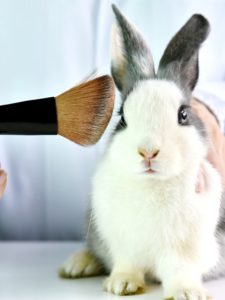

There are several countries in which it is illegal to test cosmetic products on animals, including the entirety of the EU, Israel, Canada, New Zealand, Norway, India, Taiwan and more.
03/15/2018
By Rachel Pierce | Staff Columnist
There is a new voice in California’s government, and it’s not human. Animal rights advocates created enough uproar that a new bill has been proposed that will change vendors drastically.
State Sen. Cathleen Galgiani (D-CA) proposed the California Cruelty Free Cosmetic Act this past February. The proposed bill states that it will be “unlawful” for any cosmetic manufacturer or vendor to sell cosmetics or personal hygiene products “if the final product or any component of the product was tested on animals.” If passed, the bill will go into effect on Jan. 1, 2020. According to Refinery29, those who violate this law will be fined $500 for the first offense and $1000 for the following convictions.
In short, no stores or manufacturer in the state of California can sell any product (deodorant, shampoo, conditioner or makeup) that has been tested on animals. While this is a big step for animal activists, it is not surprising that such a bill was proposed in California. Newsweek states that in 2000, the practice of animal testing was banned in the state, but products that tested animals in other parts of the world could be sold in California. This new proposed bill is like an extension of the previous. If passed, California will be the only state in the U.S. to have a law like this. However, this law would not be new in other parts of the world.
The U.S. is actually lagging when it comes to animal rights in terms of testing. Refinery29 reports that almost 40 global economies, including the European Union banned animal testing. Though many of these economies can sell products that test on animals, it is a step in the right direction. Unfortunately, there are also countries dragging behind the U.S.
In China, vendors must sell products that are tested on animals. In 2017, however, lawmakers lifted this ban for some cosmetics. Hopefully, China continues this direction.
Though California has become a trailblazer for animal rights, they are backed by a few powerful organizations and companies. These include LUSH Cosmetics, the Social Compassion in Legislation, Cruelty Free International and The Physicians Committee for Responsible Medicine. LUSH Cosmetics is not only known for their famous bath bombs, but for their dedication to a cruelty free market. According to Refinery29, LUSH Cosmetics has granted over $2 million to scientists and researchers working to develop safe alternatives to animals testing. For example, the Lewis Bioprinting Team at Harvard University has created organ-specific human tissue to replace animal testing. This may become the future of animal testing.
Whether or not the bill (assuming it passes) directly changes our market, I am hopeful that it will at least bring awareness to the public. Animal testing isn’t lathering a rabbit with our favorite shampoo. Animals are left with burns, gaping cuts and inflammation, all while living in tight quarters. It is simply inhumane. According to DoSomething.org, over 100 million animals are “burned, crippled and abused in U.S. labs each year.” In addition, 92 percent of chemicals that work on animals fail in human trials. Not only is animal testing inhuman, it is inaccurate. With only an eight percent success rate, who would trust this method anyway?
If people saw pictures of abused animals as a result of animal testing, cosmetic and hygiene aisles would look a lot different. At least that is what changed my mind. Once I saw abused animals for the sake of beauty, I went home and literally threw out any product from a company that tested on animals. I now make sure that any product I buy is cruelty free, vegan and is not sold in China. For those looking to convert, some big names that continue to test on animals, according to PeTA, are Avon, Victoria’s Secret, Maybelline, Estee Lauder and Clinique. It’s also not hard to find products that do not test on animals. In fact, a lot can be found at local drug stores, such as ELF, Urban Decay and Mineral Fusion.
Companies are thriving without animal testing. Personally, I love my cruelty-free products. I wouldn’t know the difference between shampoo that has been tested or not. All it takes is a little research. It is satisfying to know that I am not affiliated with animal cruelty. Individually, we are not going to stop animal testing. But if more and more people make the switch, I think large companies will be forced to eliminate animal testing.
If this bill does pass, it’s not going to halt animals testing. I foresee this bill stirring questions about the morality of animals testing. If people knew how horrible animal testing was I think people would avoid brands that were not cruelty -free. I think that people don’t think too much of it. Animal testing is not a matter of opinion, but morals. As people become more aware of animal testing and more governments follow the footsteps of California, it’s plausible that testing becomes a part of our past.
If you’re not convinced, I invite you to at the very least search “animal testing,” and then click images.



